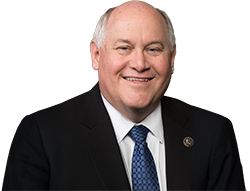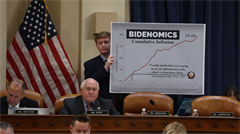Rep. Estes Questions Secretary Yellen About 19% Inflation, Tax Hikes
Washington,
April 30, 2024
|
Roman Rodriguez
(316-262-8992)
Today during a Ways and Means Committee hearing, Rep. Ron Estes questioned Treasury Secretary Janet Yellen about the devastating impact of Bidenomics, including President Biden’s latest statement reversing his pledge to not raise taxes on anyone making less than $400,000.
"Inflation is cumulative, and hardworking Kansans have been suffering for the past three years now, as this chart behind me indicates," said Rep. Estes. "Since Joe Biden took office, inflation is up over 19%. The Joint Economic Committee estimates that Kansans are paying an average of nearly $1,000 more per month for the same goods and services – the same food, the same clothes, the same gas, the same rent – that they did in January 2021. And since then, in total, the average Kansan household has spent $23,623 more due to inflation. At the same time, net income is down almost 4%." Rep. Estes went on to ask Secretary Yellen about her view of inflation and how President Biden intends to keep his pledge to not raise taxes on earners making less than $400,000 since he just recently came out saying he would let the 2017 Tax Cuts and Jobs Act expire. Rep. Estes then pointed out the pitfalls in Treasury’s Pillar One and Pillar Two negotiations at the OECD, explaining how this deal would result in the transfer of billions of dollars from the U.S. Treasury to foreign governments. Full Remarks Thank you, Mr. Chairman, and thank you, Secretary Yellen, for joining us today. As you know, last month inflation came in hotter than expected for the third month in a row – which is a hit to American families by itself – but it’s not just a one-time impact. Inflation is cumulative, and hardworking Kansans have been suffering for the past three years now, as this chart behind me indicates. Since Joe Biden took office, inflation is up over 19%. The Joint Economic Committee estimates that Kansans are paying an average of nearly $1,000 more per month for the same goods and services – the same food, the same clothes, the same gas, the same rent – that they did in January 2021. And since then, in total, the average Kansan household has spent $23,623 more due to inflation. At the same time, net income is down almost 4%. I know your boss and his administration like to point to rosier numbers, but the fact is, for everyday Americans, the chart behind me is the epitome of Bidenomics, and it’s a complete failure. Several years ago, Secretary, you called inflation “transitory.” I think that’s the wrong word, but I’d like to ask you what you would call inflation now, what word would you use? Secretary response. I think we have a difference of opinion in economists. We’ve even had Democrat and Republican economists in 2021 talking about the extra spending that was proposed by administration that was going to result in this inflation and, actually, that’s what we’ve seen. I think most Americans would use phrases like “crippling,” or “painful,” or “hindering their pursuit of the American Dream.” In fact, my constituents tell me about the challenges they face when they fill up their cars, buy groceries, or pay their rent or mortgage, and the numbers behind me show that pain that’s still continuing to increase to this day. These are the results of Bidenomics and the policies that have been increased by the Democrats over the last three years. I want to switch gears a little bit before I run out of time. You mentioned earlier in the discussion with Chairman Smith that President Biden was not going to increase taxes on people making less than $400,000. In fact, I have a tweet here from Joe Biden, dated one week ago today, talking about the Trump tax cuts and he said, “This tax cut is going to expire. If I’m reelected, it’s going to stay expired.” I did some quick calculations and basically what that means is that there’s going to be a 25% increase in the tax rate on people that make less than $44,000, there’s going to be an additional [14%] tax increase on people making less than $95,000, and additional increases on others up until making the $400,000. So, if this tweet is right, that came from President Biden, he is going to increase taxes on people making less than $400,000. Secretary response. I really want to get to one other point before we run out of time, but I can send you this tweet if you’d like to see that. I do want to talk a little bit about OECD. I know it’s been brought up before, particularly Pillar One and Pillar Two, and I’ve stated several times in the hearing room that in principle, Republicans and Democrats are in favor of eliminating the discriminatory Digital Services Taxes and providing tax certainty and simplicity and consistency for businesses in the growing digital economy. However, despite the ongoing discussions, we’re still seeing more and more countries, like Canada, enact DSTs, and the proliferation of Pillar One and Pillar Two has provided foreign countries the opportunity to raid our tax base. In fact, Pillar Two, as pointed out by the Joint Committee on Taxation, is going to cost the U.S. Treasury tax revenue. Pillar Two itself, as pointed out by my colleague Rep. Ferguson, is going to cost the U.S. $120 billion. And earlier this year, the JCT report on Pillar One noted that the plurality of in-scope companies would be from the U.S. and likely the U.S. Treasury would forgo between $100 million and $4.4 billion per year in tax receipts. In fact, I recently heard from one Fortune 100 company that they’d be required to send between $100 and $500 million from the U.S. Treasury to countries like France, and Germany and Japan. I think these policies that have been negotiated with OECD are dangerous for our U.S. tax base. We’re already struggling to collect enough revenue and I think we need to change course. I’m sorry I’m out of time, I’d like to talk more about this with you, but I’ll yield back, Chairman. |








